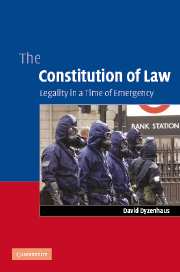4 - The unity of public law
Published online by Cambridge University Press: 10 December 2009
Summary
Introduction
In chapters 1 and 3, I briefly discussed the decision of the House of Lords in December 2004 which seems to show that judges in the United Kingdom have put a rule-of-law spine into the adjudication of national security – A v. Secretary of State for the Home Department. As before, I will refer to it as Belmarsh, as it concerned the challenge by men held in indefinite detention in Belmarsh prison to the statutory provision which authorized their detention. Belmarsh might seem to put a stop to the trend, exemplified in the House of Lords' decision in Secretary of State for the Home Department v. Rehman, discussed in chapter 3.
As we saw, Rehman adopts a stance on deference in matters of national security which proceduralizes judicial review of national security. In so doing, it substitutes for the claim that review is unavailable because of the political nature of the decision – that the decision is not justiciable – the claim that a kind of deference is appropriate which allows the executive to do pretty well what it likes. This approach to deference empties review of almost all substance, thus giving to the executive the ability to claim that it is operating under the rule of law while it is in fact largely free of legal constraints.
- Type
- Chapter
- Information
- The Constitution of LawLegality in a Time of Emergency, pp. 174 - 233Publisher: Cambridge University PressPrint publication year: 2006



